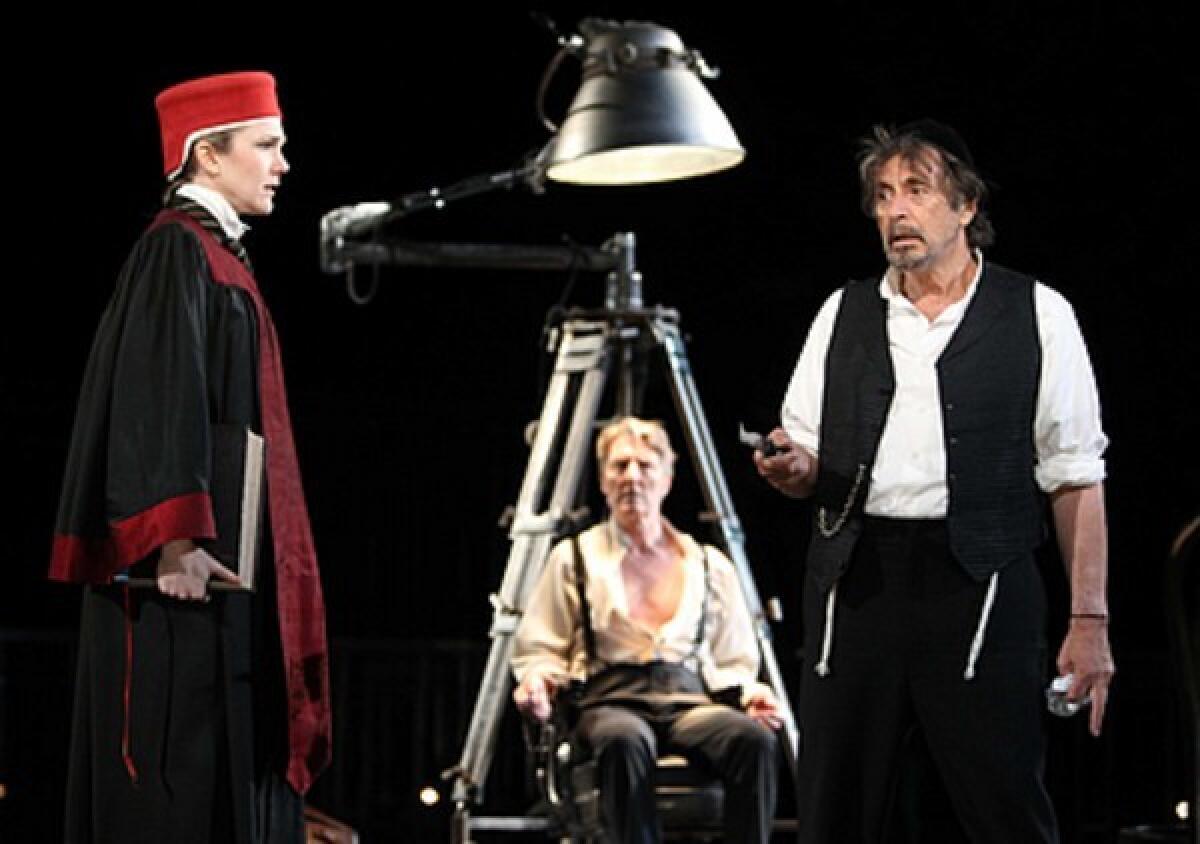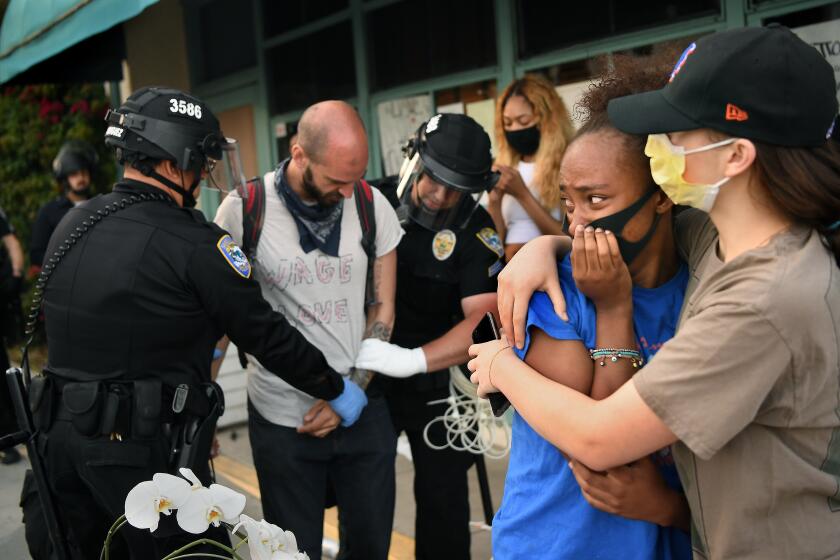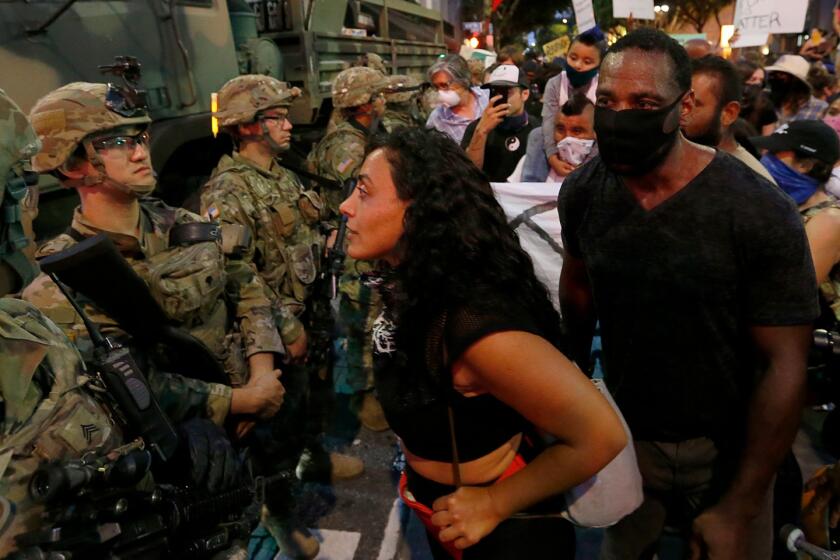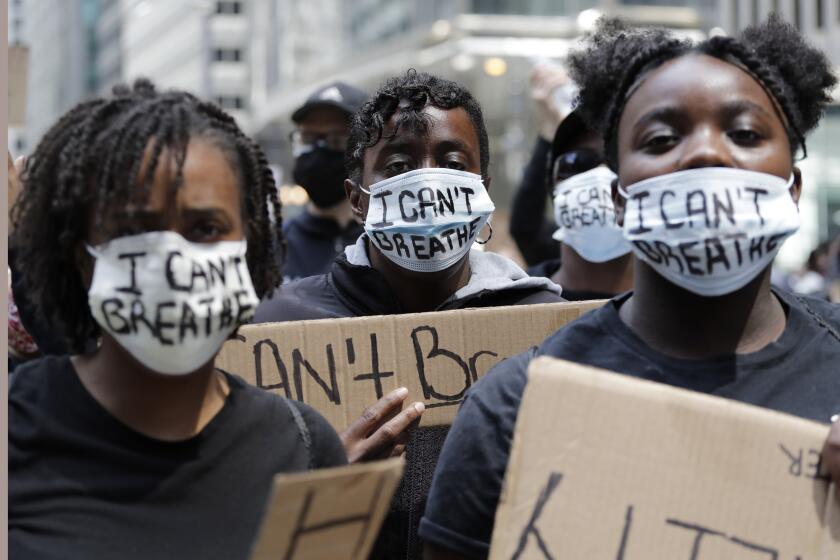Commentary: Ivanka tweets Bible verse to ‘heal’ protester pain, but Trump policies only add to it

- Share via
Stumbling upon a tweet from Ivanka Trump that quoted a Bible verse on Sunday — the day when politicians and their enablers get their holiness on — I was moved to respond with a line from Shakespeare’s “The Merchant of Venice”: “The devil can cite Scripture for his purpose.”
Representing an administration that has worked relentlessly to dismantle civil rights protections, Ivanka Trump is not in a position to take the moral high ground on race relations. As curfews rolled across a nation embroiled in protests after George Floyd, a black man, died under the knee of a Minneapolis police officer, her father has been throwing tantrums on Twitter, lashing out against the “Lamestream Media” and trying to pin the blame for the unrest on “antifa” and the “radical left.”
Ivanka’s invocation of 2 Kings 20:5 — “This is what the Lord said: I have heard your prayer and seen your tears. I will heal you” — may have been heartfelt. But unsupported by compassionate policy, the sentiment rings hollow.
Quoting from the Bible doesn’t clean one’s slate. The Bible, like any great work of literature, sacred or secular, is a source of moral instruction, but only when its study is accompanied by an honest accounting of one’s soul. As even Claudius, the villainous usurper in “Hamlet,” comes to realize after an anxious moment of prayerful contrition, “Words without thoughts never to heaven go.”
In retrospect, I wish I had replied to Ms. Trump’s tweet with different lines from “The Merchant of Venice.”
The spiritual eloquence of Portia’s indelible “the quality of mercy” speech might have tempted the first daughter and senior advisor to the president to retweet an excerpt to her 8.8 million followers. This would have done some civic good as Shakespeare’s meditation on the word “mercy” illuminates what has been missing in the Trump administration’s conception of justice.

It’s easy to imagine Ivanka Trump identifying with Portia — a wealthy heiress with style and wit who is one of Shakespeare’s most beloved female characters. Intelligence and generosity set this romantic heroine apart, but so too does self-awareness, even when she falls short of her own high ethical standards.
In disguise as a young male lawyer, Portia enters the courtroom in which Shylock, a Jewish moneylender, is insisting that the authorities honor the terms of his loan to Antonio — the merchant of the play‘s title and the best friend of Portia’s new husband, Bassanio. The contract stipulates that failure to repay on time will entitle the lender to a pound of Antonio’s flesh. The law is on the side of Shylock, who bears a grudge for the way he has been spat upon by bigoted Christians. The stakes are high not only for Antonio: Venice’s standing as a world capital of trade depends on this enforcement of contractual obligations.
White people who want to be allies need to worry less about the George Floyd protests and more about the systemic racism that sparked them.
But Portia reminds the court of an order of justice that supersedes the written code. “The quality of mercy is not strained,” she stirringly begins. Her point is that mercy cannot be compelled. It exists on a higher plane, being “an attribute of God himself.” Only “when mercy seasons justice,” she contends, does “earthly power” resemble the Almighty’s.
Therefore, she appeals to Shylock, “Though justice be thy plea, consider this/That in the course of justice, none of us/Should see salvation. We do pray for mercy,/ And that same prayer doth teach us all to render/The deeds of mercy.”
Mercy isn’t the same thing as forgiveness. The dictionary offers as a definition “compassion or forbearance shown especially to an offender or to one subject to one’s power.” In church, Christians repeat the phrases “Lord have Mercy” and “Christ have mercy,” recognizing both our inherent sinfulness and our helplessness in the face of death.
Portia’s insight derives from an acceptance of this fundamental humility. We do unto others as we would have them do unto us — not because we are naturally good but rather because we understand how quickly the tables can turn. The officer who kept his knee on George Floyd’s neck appears to have confused the limited scope of his authority with a greater impunity, a power over life and death that exempted him from human vulnerability.
Get live updates from Los Angeles Times journalists as they report on protests across the U.S. after the death of George Floyd while in police custody.
Trump’s political platform — engineered to help the rich and powerful by exploiting partisan, regional and cultural divides — can similarly be understood as the failure to imagine a reversal of roles between knee and neck. In 2016, Trump called himself “the law and order candidate,” and now he has said he’ll deploy “thousands and thousands of heavily armed soldiers, military personnel and law enforcement officers” to “dominate” protesters — protesters who have taken to the streets because of lethal racial disparities in our criminal justice system.
“Any difficulty and we will assume control but, when the looting starts, the shooting starts,” the president tweeted early Friday, bringing back an ugly piece of rhetoric from the segregationist South. Mercy isn’t in his vocabulary. Unable to imagine being oppressed, he has little tolerance for the grief and anger that are interrupting his weekend golf outings. The pandemic has had the audacity to threaten his reelection bid, an untenable development that has placed public health decisions in the hands of political loyalists. Now that chaos is reigning in the streets, Trump wants the military to do what his abysmal statesmanship has botched.
All the law and order in the world cannot restore justice to a government indifferent to mercy. The cries in the streets will not be quelled by batons, rubber bullets and tear gas. Nor will Biblical verses miraculously bring about healing.
Portia doesn’t have much luck reasoning with Shylock, who is determined to exact his revenge. To rescue Antonio’s life, she outsmarts the vindictive plaintiff by telling him that he may have his pound of flesh, but if “one drop of Christian blood” is shed in the process, his lands and goods will be confiscated.
The main concern of black people right now isn’t whether they’re standing three or six feet apart, but whether their sons, husbands, brothers and fathers will be murdered by cops.
Mercy fails even Portia in the end. Shylock is stripped of his wealth and forced, in a cruel bargain with Antonio, to renounce his religion and convert to Christianity. “The Merchant of Venice” is one of Shakespeare’s most problematic works, reflecting an anti-Semitism that was endemic in Elizabethan society.
But Shakespeare wasn’t unaware of what he was revealing in Portia’s character. “It is a good divine that follows his own instructions,” she says early on in the play to her waiting-gentlewoman sidekick. “I can easier teach twenty what were good to be done, than be one of the twenty to follow mine own teaching.”
Shylock’s egregious punishment is rendered acceptable because of his outsider status as a Jew in Christian Venice. Justice is easier to deny to an imagined enemy than it is to a fellow partygoer.
In a polarized world like Portia’s and our own, mercy is a practice, not a dashed-off prayer.
More to Read
The biggest entertainment stories
Get our big stories about Hollywood, film, television, music, arts, culture and more right in your inbox as soon as they publish.
You may occasionally receive promotional content from the Los Angeles Times.














